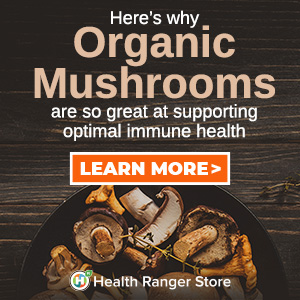
New field of nutrigenomics reveals how what you eat now can prevent future disease
Saturday, March 27, 2010 by: S. L. Baker, features writer
Tags: nutrigenomics, disease, health news
- MEDICAL BOMBSHELL: FDA admits Covid mRNA 'Vaccines' CAUSE CANCER
- Antidepressants (Lexapro and Paxil) linked to devastating birth defects, lawsuits reveal
- Germany’s left-wing government pushes for mass migration and voting rights for non-citizens, sparking outrage
- Big Brother banking: How the Biden administration weaponized financial surveillance to target conservatives
- Mount Spurr volcano nears eruption: Scientists warn of impending danger for Alaskan communities
- PLANDEMIC BLESSING: For those who survived, the PLANDEMIC was a blessing in disguise
- Report reveals true extent of air pollution crisis: Only 7 countries meet clean air standards
- Unleashing energy, empowering growth: EPA's historic deregulatory push aims to revive economy while balancing environmental stewardship
- FULLY UNTESTED: Creator of the PCR test Mullis, who won Nobel Prize in Chemistry for it, on record saying PCR tests are NOT SUITABLE for viral detection
- “Feel G.O.O.D. Gut Health Program” on BrightU: The life-changing power of gut health
- Unraveling the hidden dangers: Gary Null’s call for a toxin-free life
- Over 80% of USAID programs CANCELED, the rest transferred to State Department
- FBI warns of surging road toll text scams
- Trump reverses course on Gaza plan, says “nobody is expelling Palestinians”
- Light transformed into a SUPERSOLID: A quantum leap in physics
- Elon Musk visits NSA headquarters, signaling potential overhaul of controversial spy agency
- Former horse rancher and 6,000 other plaintiffs are suing Syngenta after paraquat exposure led to Parkinson's Disease
- House Intelligence Committee calls for the ARREST and PROSECUTION of Dr. Anthony Fauci
- MEDICAL BOMBSHELL: FDA admits Covid mRNA 'Vaccines' CAUSE CANCER
- Modern science uncovers brain-boosting power of ancient spice coriander and its key compound linalool
- Former horse rancher and 6,000 other plaintiffs are suing Syngenta after paraquat exposure led to Parkinson's Disease
- Ballot drop boxes set ablaze in Oregon and Washington, prompting security concerns ahead of election
- Michigan sheriff announces criminal investigation into 2020 election crimes, Dominion Voting Systems
- Peter Rost exposes Big Pharma corruption in his book “The Whistleblower: Confessions of a Healthcare Hitman”
- House Intelligence Committee calls for the ARREST and PROSECUTION of Dr. Anthony Fauci
- OpenAI whistleblower who dissented against how the company trained ChatGPT found dead
- Jimmy Kimmel ‘illegally’ tells Trump voters they can wait until Friday
- Migrants are taking advantage of recent hurricanes to scam residents and loot their homes
- California's social media censorship law struck down: A victory for free speech or a threat to online safety?
- CONSERVATIVES SOUND THE ALARM: Big Pharma and the Left trying to force $32 billion money grab from America’s seniors into year-end spending deal
- Israeli soldiers accused of even more torture and abuse in the West Bank
- Russia warns citizens against traveling to the United States, Canada and the European Union
- Jena Griswold “breaks” 2024 election in Colorado: Results will be 100% non-certifiable, warns Patrick Byrne
- The Health Ranger releases “Vaccine Zombie” song and music video, using AI-animated zombies for the music video
- Dr. Mike Yeadon releases 15-minute testimony - WATCH - about genocidal intent of COVID “vaccines”
- Florida takes a stand: DeSantis proposes permanent ban on mRNA vaccine mandates
- EPA advisor admits the agency is funneling billions to climate groups ahead of Trump’s return to White House
- RFK Jr. clears key hurdle: Sen. Susan Collins backs controversial HHS nominee, signaling a new era for health policy
- The Health Ranger releases “Vaccine Zombie” song and music video, using AI-animated zombies for the music video
- Congratulations to the FULLY UNVACCINATED as you resisted the COVID-19 PROPAGANDA MACHINE fueled by over $100 BILLION
- The pandemic as a tool for INDOCTRINATION: Understanding “The Indoctrinated Brain” by Dr. Michael Nehls
- DIRTY VACCINES: Dr. Anthony "Fraudulent" Fauci, King of the Covid scamdemic, admits "We don't do placebo trials on vaccines"
- Mike Adams releases new song and music video: Nothing More Disgusting Than a Globalist
- Fake "CLIMATE CHANGE" will continue to devastate any regions the globalists and ruling elite want to purchase at a discounted price
- Trump administration takes on global censorship: A new frontier for free speech advocacy
- Mike Adams releases country western hit single: Goin’ Back in Time is Comin’ Home
- Mint: The ancient herb that refreshes, soothes and heals
- South Korean banks halt silver bar sales amid global and domestic uncertainty
- Unpacking the Lies That We’ve Been Fed – new song and music video released by Mike Adams, the Health Ranger
- Mike Adams releases music poetry sensation: A Child of God
- Global leaders unite to clamp down on “misinformation” with UN-backed Cascais Declaration
- Ex-FBI Chief EXPOSES disgraceful government coverups of Oklahoma City Bombing, Kennedy assassinations, 9/11 WTC, and "Terrorism" as plot to destroy Constitution
- Federal judge backs Trump's mass firings, clearing path for government downsizing
- Trump's impressive political comeback against all odds makes headlines around the world
- Red Cross issues warning to stop blood plasma donations from vaccinated people
- Scientists confirm: GENIUS brain function can be spontaneously unleashed in humans without any apparent cause
- HYSSOP: What research reveals about the health benefits of this ancient holy herb
- EPA advisor admits the agency is funneling billions to climate groups ahead of Trump’s return to White House
- Two containers with completed ballots fall out of truck in Florida
- Fully vaccinated about to see “tsunami” of illness and death, warns virologist
- Today I asked our AI language model “Neo” about which phytonutrients or phytochemicals can block the spike protein related to SARS-CoV-2 … Here is what it answered…
- Global leaders unite to clamp down on “misinformation” with UN-backed Cascais Declaration
- BREAKING: 2025 NDAA authorizes mandatory military draft of WOMEN across America… as Pentagon pursues global NUCLEAR war with both Russia and China at the same time
- DATA: England’s vaccinated population had close to one million deaths in 23 months; unvaccinated population had less than 61,000 deaths over the same period
- ENGINEERED FAMINE: Oregon starts SHUTTING DOWN small farms “to protect the people”
- Michael Yon warns of a ZIONIST TAKEOVER in Trump’s second administration
- Ozempic and Wegovy weight loss drugs are injectable LIZARD VENOM PEPTIDES that may unleash a devastating wave of organ failure… side effects align with symptoms of SNAKE BITES
- BOMBSHELL: DNA testing kits are a SCAM to develop ethnic-specific bioweapons
- Israeli soldiers accused of even more torture and abuse in the West Bank
- NASA admits that climate change occurs because of changes in Earth’s solar orbit, and NOT because of SUVs and fossil fuels
- These 13 countries just signed an agreement to engineer a global FAMINE by destroying food supply
- Sermon 30: How Jesus reveals Caesar’s FAKE CURRENCY and FALSE AUTHORITY
The key to this revolutionary stop-disease-before-it-happens strategy isn't a new drug, vaccine or sophisticated gene therapy. Instead, it is eating specific foods.
K-State researchers recently published an academic journal article in Food Technology outlining the potential for nutrigenomics, a field that studies the effects of food on gene expression. Simply put, scientists could eventually recommend specific foods for an individual based on his or her genetics that will prevent future diseases -- especially those that tend to "run in families", such as certain cancers, type 2 diabetes, cardiovascular diseases and even obesity.
"Nutrigenomics involves tailoring diets to someone's genetic makeup," Koushik Adhikari, K-State assistant professor of sensory analysis, said in a statement to the media. "I speculate that in five to 10 years, you would go to a genetic counselor or a physician who could help you understand your genetic makeup, and then a nutritional professional could customize your diet accordingly."
Nutrigenomics combines molecular biology, genetics and nutrition to pinpoint how gene expression can be regulated through specific nutrients. That's important because nutrients have been shown to affect gene expression through transcription factors (biochemical entities that bind to DNA and either promote or inhibit transcription of genes).
Nutrigenomics does not involve genetically modifying a food's DNA by splicing and adding genes. Instead, nutrigenomics focuses on using foods' natural phytochemicals, nutrients and other components to promote better health. And while current mainstream medicine's preventive recommendations that involve diet -- such as eat plenty of fruits and vegetables to lower the risk of cancer -- are generalities for the overall population, nutrigenomics research involves developing specific health recommendations that can be modified to an individual's needs.
"Scientists are looking at the molecular mechanisms in the body," Adhikari explained in the media statement. "At the molecular level, you can look at what specific nutrients can do to your body that would trigger genes to act properly, in a healthy way."
"That is where I think the main focus of nutrigenomics is going to be in the future," Adhikari said. "It could tell you that you have the propensity for certain chronic diseases so that you could modify your diet accordingly." He added, for example, that with a better understanding of how nutrients alter gene expression, there is a potential that food could be used instead of medication to combat problems like high cholesterol.
K-State researchers in human nutrition are currently working on these kinds of studies. For example, they are investigating the impact plant chemicals have on preventing different types of cancers. They are also studying how the Chinese fruit known as wolfberry could be used to improve vision. These research projects are designed to not only answer whether specific nutrients prevent a disease, but also how they exert their health benefits.
For more information:
http://www.k-state.edu/media/newsreleases/ma...
Nutrigenomics at FETCH.news
Get independent news alerts on natural cures, food lab tests, cannabis medicine, science, robotics, drones, privacy and more.
Take Action: Support Natural News by linking to this article from your website
Permalink to this article:
Embed article link: (copy HTML code below):
Reprinting this article:
Non-commercial use OK, cite NaturalNews.com with clickable link.
Follow Natural News on Facebook, Twitter, Google Plus, and Pinterest
Science News & Studies
Medicine News and Information
Food News & Studies
Health News & Studies
Herbs News & Information
Pollution News & Studies
Cancer News & Studies
Climate News & Studies
Survival News & Information
Gear News & Information
News covering technology, stocks, hackers, and more



"Big Tech and mainstream media are constantly trying to silence the independent voices that dare to bring you the truth about toxic food ingredients, dangerous medications and the failed, fraudulent science of the profit-driven medical establishment.
Email is one of the best ways to make sure you stay informed, without the censorship of the tech giants (Google, Apple, Facebook, Twitter, YouTube, etc.). Stay informed and you'll even likely learn information that may help save your own life."
–The Health Ranger, Mike Adams













































